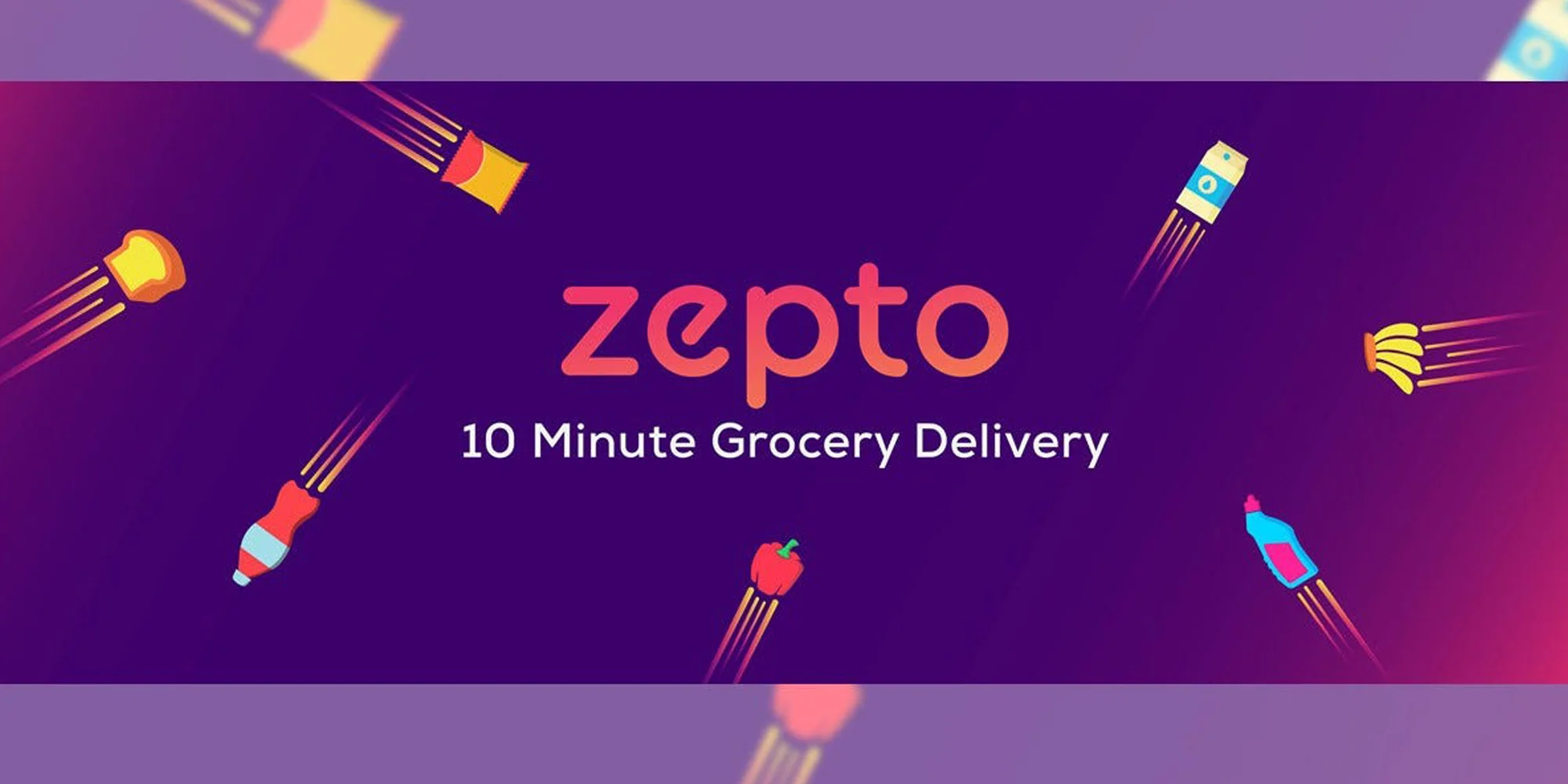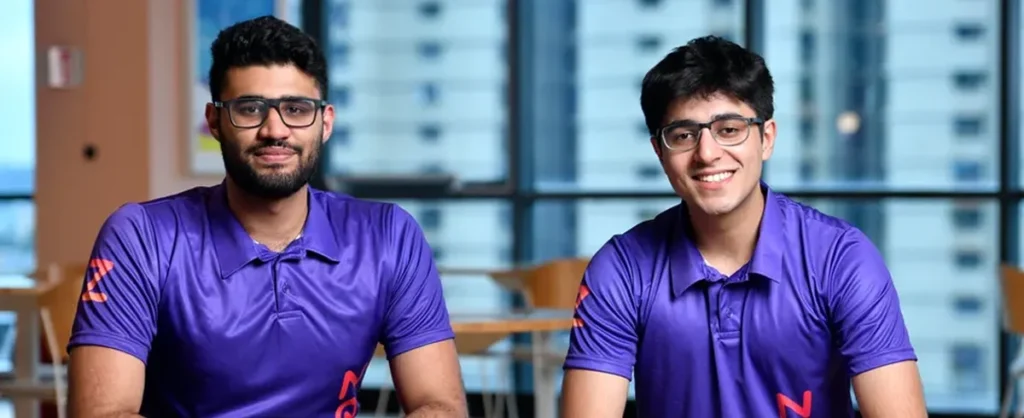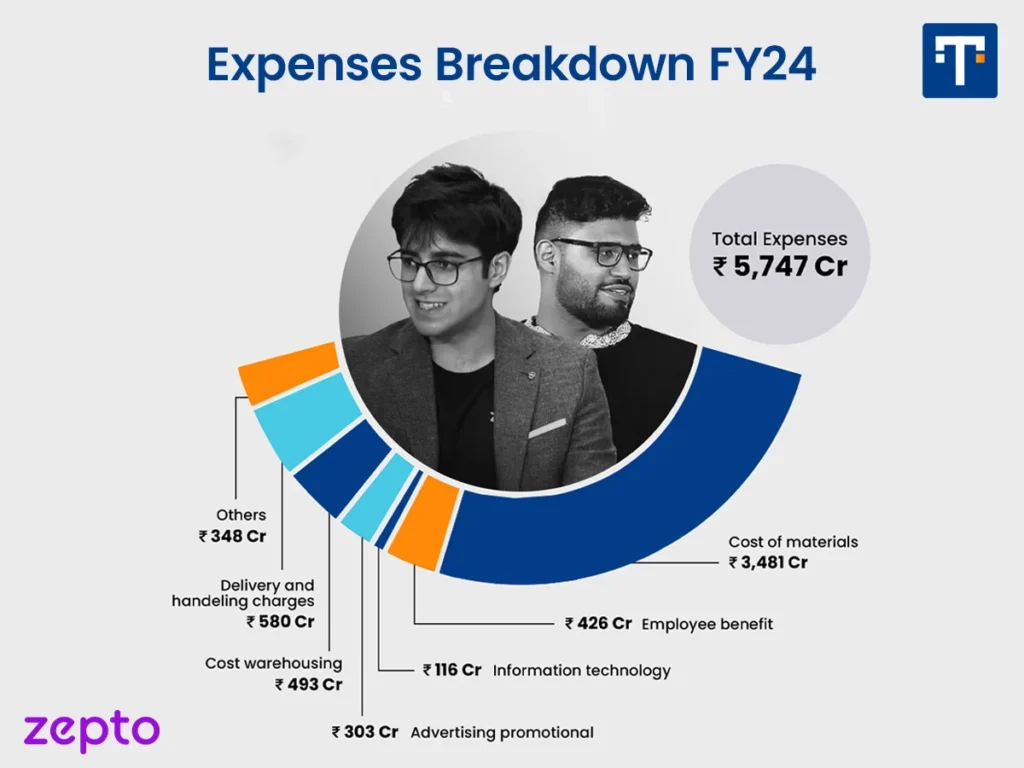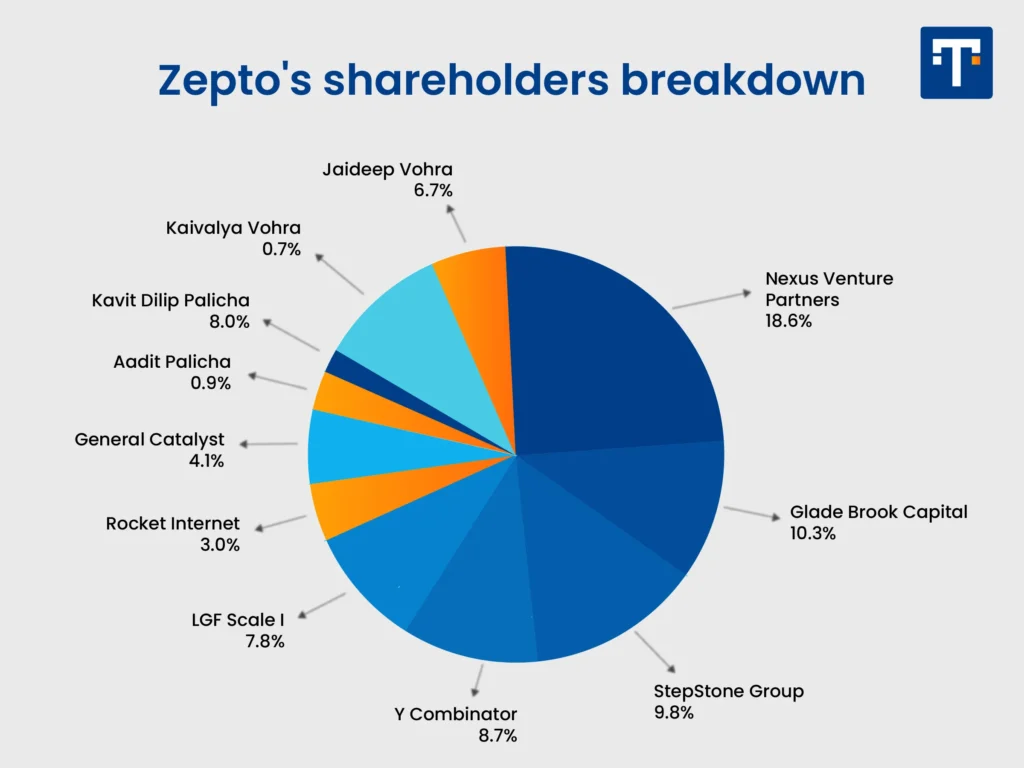Necessary Always Active
Necessary cookies are required to enable the basic features of this site, such as providing secure log-in or adjusting your consent preferences. These cookies do not store any personally identifiable data.
|
||||||
|
||||||
|
||||||
|

In a country where traffic jams and long delivery windows are part of daily life, two young entrepreneurs dared to dream of a bigger world where groceries arrive at your doorstep before you finish your first cup of coffee. That bold vision gave birth to Zepto, India’s fastest-growing quick commerce platform. Founded in 2021, Zepto swiftly became a household name, standing out among industry giants like Blinkit, Swiggy Instamart, and BigBasket in the highly competitive market.
What began as an easy goal of getting groceries to customers in under 10 minutes quickly turned into a logistics revolution powered by technology. Supported by a rapidly expanding base of dark stores and fueled by practicality, Zepto is not only serving the needs of city consumers but also redefining the expectations of an entire industry.
Zepto’s success story wouldn’t be complete without the vision and leadership of its two founders, Kaivalya Vohra and Aadit Palicha. These Stanford dropouts have disrupted the quick commerce industry in India, through their passion for innovation and a focus on speed and convenience. Let’s take a closer look at each of them.

As co-founder of Zepto, Kaivalya Vohra stands out for his deep expertise in technology and business foundations. After deciding to drop out of Stanford University, Kaivalya pursued building a company that could transform the grocery delivery industry through its innovative business model. He dropped out of college because he knew advanced technology paired with innovation could address critical issues in the real world.
Since childhood, Kaivalya has demonstrated his enthusiasm for both business and technology by studying how systems operate and how performance could be enhanced. At Zepto, Kaivalya concentrates on technical operations that drive business efficiency and scalability while positioning the company for future developments.
The other half of the Zepto’s founder pair, Aadit Palicha, is a visionary, who shares the entrepreneurial spirit of Kaivalya. Like Kaivalya, Aadit also left Stanford to follow the ambitions of his entrepreneurship. With a background in computer science, Aadit’s deep technical knowledge in the development of Zepto has played an important role in the construction of back-end infrastructure and technology stack.
Aadit is deeply passionate about making Zepto a game-changer in logistics and Quick Commerce Space. Their leadership skills and the ability to customize quickly helped expand the Zepto at an impressive speed, keeping it ahead of its rivals in the hyper-practical distribution market.
The foundation of Zepto emerged from the basic yet essential insight that Indian grocery delivery service offered slow delivery alongside inconsistent service quality. Aadit Palicha and Kaivalya Vohra both endured this experience when they lived in Mumbai during pandemic lockdowns. Shopping deliveries showed them multiple operational flaws, so they started looking for an optimized method which provided fast consistent essential delivery services.
The pair tested various logistics systems as well as delivery solutions. The company first piloted its early concept with the name “Kirana Kart” before relaunching as Zepto which originates from the scientific unit representing high speed. The name “Zepto” embodied their purpose because it represented their goal to deliver groceries through superfast service that took no longer than ten minutes.
The company established dark stores which function as small warehouses situated strategically for exclusive online delivery purposes. The dark store model enabled Zepto to deliver orders faster while maintaining inventory management and producing better service quality for customers. They started with small grocery operations across Mumbai neighborhoods and received encouraging customer responses which confirmed the success of their quick commerce approach.
Within only a few months of its inception during pandemic, Zepto launched as a disruptive force to transform the grocery delivery market. Through their strong operational framework combined with their simple proposition, Zepto found success with city residents before becoming an overnight sensation.
Zepto’s business model is quick commerce, or Q-commerce, which involves bringing goods to customers within 10 minutes. The pillar of this model is its network of dark stores and small, unstaffed warehouses that are not open to customers but strategically positioned in densely demanded urban neighborhoods. The dark stores help Zepto track inventory precisely and deliver products with dramatically shorter lead times, achieving efficiency in last-mile logistics.
Each dark store is ideally located in the 1.5 to 2 km of high-density neighbourhoods. By adopting this hyperlocal model, Zepto manages to complete deliveries quickly without maintaining high operational overheads. Until March 2025, Zepto had already crossed its threshold of 700 dark stores opening ahead of its March 2025 target. These stores receive inventory using innovative demand forecasting models, thereby preventing wastage and making high-demand products available.

Zepto’s products range from fresh fruits and vegetables to daily groceries and personal care products—positioning it as a one-stop destination for urban shoppers. Zepto’s technology-driven logistics enable it to deliver thousands of orders every day, with real-time tracking and high service assurance.
To fuel expansion, Zepto targets cities that have many working professionals and technology-savvy consumers. Growth strategies includes going deep in metros first and then slowly expanding to Tier-2 cities where the demand for convenience is increasing. Zepto has also started exploring non-grocery categories such as pet care, electronics accessories, and beauty products—widening its range even further.
Their advertising focuses on speed, reliability, and convenience, which appeal to India’s urban fast-paced lifestyle. Additionally, with the regular app-based offers and a minimalist user interface, Zepto can sustain high user retention.
Think compact, high‑density neighborhoods and very short travel radiuses. Orders are routed to nearby dark stores, staff receive a route‑optimized pick list, and most baskets are packed within a minute. Riders are assigned based on proximity and live road conditions, so the last mile is short and predictable. That is how a ten‑minute promise fits busy city life without compromising basic order accuracy.
Coverage is deepest in major metros and high‑density urban clusters, with store networks placed roughly 1.5–2 km from the customer. Expansion follows a simple pattern: go deep in large cities first, then widen into surrounding hubs as order density proves consistent. If a location does not yet appear in the app, it usually means the nearest store grid is still being built out.
Zepto avoids random location decisions when establishing new dark stores. The company uses Artificial Intelligence along with local store data to locate neighborhoods with heavy order volume before establishing dark stores within 2 km area around these zones. By placing their dark stores close to high-order zones the delivery times become significantly shorter while easing the workload on riders.
Each dark store operates with real-time stock level updates enabled through its smart inventory system. A predictive system monitors products that sell quickly according to weather conditions or popular demand, thus enabling the store to avoid missed orders by restocking promptly.
The moment an order drops in, staff at the dark store get a route-optimized picklist. Items are sorted based on popularity and shelf proximity, allowing pick-and-pack in under 60 seconds. It’s like a mini-Amazon warehouse in every neighborhood.
This software analyzes current traffic alongside road constraints and rider status to select the closest delivery partner for the task. Real-time optimization optimizes every route to help deliverers finish their routes within the set time constraints regardless of urban traffic problems.
From store managers to dispatch riders, everyone uses a central dashboard. It tracks KPIs, rider status, orders, and even flags slowdowns. Instant alerts keep operations running like clockwork.
Zepto uses past orders, local events, holidays, and weather data to predict surges. This way, stores stay prepared for everything—from IPL snacks to unexpected rain.
The customer app provides seamless UX with real-time monitoring and intelligent recommendations. The rider app steers delivery partners with route suggestions, slot-based prioritization, and order notifications. Collectively, they complete the loop with velocity.
Zepto is constantly testing. From drone delivery pilots to expanding its EV fleet, the brand’s tech team is always a step ahead, building for what tomorrow’s quick commerce will look like.
Zepto’s growth has not only transformed grocery delivery but has also started to have a noticeable impact on the Quick Service Restaurant (QSR) ecosystem in India. Through its hyperlocal dark store strategy and commitment to 10-minute delivery, Zepto has changed the way food and beverage brands consider logistics, last-mile delivery, and customers’ expectations. Zepto has also opened opportunities for smaller food brands and local sellers. They now tie up with Zepto to distribute their packaged foods like snacks, beverages and ready-to-eat items at Zepto Cafe.
Amongst the most influential changes Zepto has brought on is the increased pressure on QSR chains to cut back their delivery hours. Consumers accustomed to lightning delivery of groceries have started to make similar demands of restaurants and coffee shops. Many QSR companies have been moved by this trend to re-engineer their respective supply chains, kitchen models, and delivery alignments.
Also, Zepto’s model is an exact fit for the increasing preference for convenience food. From midnight snacks and meal kits, to emergency essentials, Zepto serves a base of consumers that is increasingly valuing immediacy. This is changing the menu structure of QSRs with an increased number of fast prep options, decreasing portion sizes, and delivery-tailored packs.
Café was designed to deliver hot and packaged food alongside daily essentials. In 2025, the company scaled back the concept in several neighborhoods to refocus on core grocery speed and reliability. The everyday model remains the same: short‑haul dark stores, fast picking, and dispatch that favors short travel time over long detours.
The transformation of Zepto from its initial concept to a billion-dollar organization accelerated as fast as the company’s 10-minute delivery services.

This funding allowed Zepto to hit major milestones—including 700+ dark stores by March 2025—while building smart logistics systems and data-driven operations.
These financial investments became the foundation that enabled Zepto to fulfill its ambition of constructing 700 dark stores throughout India which it accomplished by March 2025. The funding enabled Zepto to develop strategic technology innovations and implement data-driven supply chain management systems while expanding its presence in India’s expanding Q-commerce market segment.
The long-term business plan for Zepto involves it’s global expansion through entry into international markets. The company has successfully penetrated the high-demand Indian market so it can effectively implement its model in other emerging markets with similar consumer behaviors spanning Southeast Asia through the Middle East and parts of African regions.
One of the most promising growth paths for Zepto depends on its planned Initial Public Offering. The rapid expansion and rising investor trust makes Zepto ready to initiate its public share offering sometime within the next few years. The proposed IPO will serve two distinct purposes by providing the company with extra financial resources while giving it a better competitive position worldwide in quick commerce.
Zepto has a positive outlook on its future expansion plans. The quick commerce revolution will have Zepto positioned in front because its delivery speed and operational efficiency will meet the expanding consumer demand. Through ongoing innovation and establishment of new scale operations the company positions itself to revolutionize last-mile delivery standards and elevate customer satisfaction levels in the future.
Is Zepto still doing 10‑minute delivery in 2025?
The service continues in high‑density neighborhoods where store placement and rider supply are close to customers. Timing can vary by area and time of day, but the model still targets very short delivery windows.Which cities have Zepto’s 10‑minute service?
The app shows the most accurate picture by PIN code. Broadly, coverage is deepest across major metros and adjoining urban hubs where the store grid and rider base are already established.What is Zepto Cafe and why was it scaled down?
Café delivered fresh food alongside everyday items. In 2025 it was reduced in some neighborhoods so the company could focus on the most reliable, repeatable parts of the core model.How does Zepto keep delivery windows short?
Store placement within a small radius, quick pick‑and‑pack workflows, and dispatch that accounts for live traffic reduce travel time and idle steps.
Sign up to receive our newsletter featuring the latest tech trends, in-depth articles, and exclusive insights. Stay ahead of the curve!